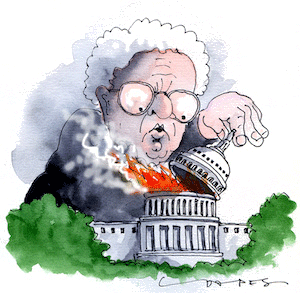Race based vote gutting
ROGER FITCH ESQ • TUESDAY, NOVEMBER 13, 2018
Post mid-terms ... Trump toady takes over as AG ... Voter suppression in overdrive ... Racial tone to election rigging ... Roberts court heads off the "danger" of non-white voting ... Trump's election stunts ... From Roger Fitch ... Our Man in Washington
 THE US political climate remains dire following the elections. A venal authoritarian remains president, and the senate, America's own "unrepresentative swill", is still controlled by a dangerous political party ready to rubber-stamp appalling appointments to government agencies and federal courts.
THE US political climate remains dire following the elections. A venal authoritarian remains president, and the senate, America's own "unrepresentative swill", is still controlled by a dangerous political party ready to rubber-stamp appalling appointments to government agencies and federal courts.
Thanks largely to Republican gerrymanders, there was no "blue wave" in the US House (contra here), but Democrats managed to wrest control of it, while breaking the "death-grip" of their opponents on a number of state governments.
A new level of Trump bad behaviour followed. Ominously, the president sacked his long-suffering attorney-general and replaced him with a controversial Trump loyalist who could stifle the special prosecutor's investigations, and even disclose to Trump the deliberations of Robert Mueller's grand jury.
Fortunately, the timely release by the National Archives of the 1974 "Watergate Road Map" suggests a way forward for the special prosecutor, e.g. a report to congress, where a war is brewing: Democrats promise house investigations of their spectacularly corrupt president, while Trump threatens senate investigations of Democrats.
The senate could remain Republican for years, frustrating efforts to rectify the vote suppression, i.e. election fraud that enables minority Republicans to stay in office. Fortunately, 15 states had voting measures on their ballots this year, mostly to broaden the franchise, more here.
The biggest rout of Republican representatives was in the Northeast, but there were gratifying results elsewhere, e.g. in southern California, where "Russia's favourite congressman", Dana Rohrabacher, was ousted after 30 years.
In Wisconsin, Gov. Scott Walker was defeated, though the Republican legislature quickly began stripping the incoming Democrat of his powers; an identical phenomenon occurred in 2016 in North Carolina when another Democrat governor won in a Republican state.
Having tightened the recount provisions in 2016, Walker had to come within one percent of his opponent to qualify for a recount. To considerable Schadenfreude, he finished 1.2 percentage points behind.
Governorships were also "flipped" by Democrats in Nevada, New Mexico and Kansas, where America's leading vote-suppresser, Kris Kobach, was defeated. There were further pickups in Illinois, Michigan, and Maine, where Paul LePage, the "craziest governor in the US", retired.
Voters fought back with initiatives, e.g. in Florida, where 1.4 million people with past felony convictions were re-enfranchised, and in Michigan where an anti-gerrymandering measure passed (there were other initiatives, some with sad results, and state constitutional amendments, e.g. in Alabama, where "fertilised eggs are now people").
Democrat senators in Indiana, North Dakota, Missouri and possibly Florida were knocked out, but the party picked up senate seats in Nevada and (apparently) Arizona, leaving the Republicans with a net gain of two senate seats (Democrats are expected to lose a Mississippi run-off).
In Florida, Democrats seemed about to retain Senator Bill Nelson, but the results were so close that the Republican candidate, the cadaverous Rick Scott, pulled ahead and a recount was ordered. Scott, the outgoing governor, instantly accused the Democrats, without evidence, of fraud. Significantly, Scott seemed intent on stopping, not just a recount, but the ongoing initial vote count.
 Swiftly changing demographics
Swiftly changing demographics
Despite the vote suppression, the turnout of an estimated 48.1 percent of eligible voters was far better than the 2014 midterm's 36 percent, where candidates could have won office with 18.01 percent of the eligible electorate.
The Democrats would have done better but for the voter-suppression tactics of the Republicans, put into shameless overdrive as the election approached, more here.
While Republicans disingenuously claim the measures are necessary to prevent voting fraud, the real fraud is denying the vote. Rarely is the tactic reported for what it really is: a racist vote suppression program, cut from the same cloth as unconstitutional poll taxes.
As a new book notes, whites have suppressed black voters from the moment the latter won significant rights to vote, but non-white voting now presents a demographic danger to Republican rule. It is this perceived existential threat that has led Republicans to embrace minority rule.
Such election fiddling first appeared in the 19th century in the hands of southern whites, but oddly, not in 1877, at the end of Reconstruction and the federal occupation of the South that followed the Civil War. It wasn't until 1890 that the South began systematically stripping African-Americans of their vote, a practice that continued until the adoption of the Voting Rights Act in 1965.
Before 2000, no America state had a strict voter ID requirement. Then, in Crawford v Marion County (2008), the supreme court upheld a law requiring photo IDs.
 Roberts: vote gutting CJ
Roberts: vote gutting CJ
In Shelby County v Holder (2013), the Roberts Court gutted the VRA's recently re-enacted enforcement provisions requiring Justice Department pre-clearance of proposed voting laws in historically-offending states.
Mere hours after the 2013 decision, the reconstituted confederacy (now including states like Indiana, Ohio, Kansas, North Dakota and Arizona) began deterring or preventing votes by those groups of people, largely black or other minorities, seen as likely Democrat voters.
Shelby County v Holder is now seen as one of the supreme court's worst decisions, in a class with Plessy v Ferguson. In realising a long-held goal of hobbling Johnson's voting rights legislation, CJ John Roberts wrote that the VRA's essential pre-clearance enforcement section for bad-faith prior-offending states was no longer constitutionally warranted: racism was no longer a problem.
What followed Shelby County was a flood of new tactics, calculated, racially-motivated vote suppression schemes, conferring an advantage Republicans will still have when the 2020 census precipitates a new round of redistricting.
It seems to have been the successful partisan interference by Republicans in the razor-close 2000 election, culminating in the supreme court's Bush v Gore, that emboldened the party.
Vote suppression will only get worse as Republicans try to stave off such apocalyptic, but inevitable, events as politically-suspect Latinos outnumbering "whites" in Texas, the second most populous state.
* * *
One of Donald Trump's legally-dubious election stunts was to send thousands of US soldiers to Texas and the Mexican border. A probable violation of the Posse Comitatus Act, it was nicely timed to coincide with the midterm elections and intimidate (and deter from voting) Hispanic-Americans.
Perhaps election interference, a real threat to "national security", should have prompted Bill Clinton to send federal troops (or national guard) to Miami on November 22, 2000. They might have quelled the election-changing "Brooks Brother riot", a faux demonstration by Republican staffers and operatives that prevented the recount of votes, giving Bush lawyers (including Brett Kavanaugh) time to get a temporary stay from a sympathetic supreme court justice.
That order stopped the recount while Bush was ahead and the recount was never resumed, though it became clear afterwards that Gore actually won the popular vote in Florida, and thus the electoral college.
The rest, as they say, is history.
No comments:
Post a Comment